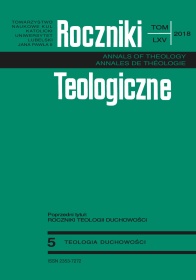Stages of Moral (Human) Development and Images of God
Abstract
In sharp contrast to views expressed in some earlier theories about life and human development, today human development is considered a “work in progress.” It is a continuous journey on which a person passes through various stages. This dynamic understanding of human development also characterizes moral development. The article's first part takes up these points. The second part focuses on the contextualized nature of this lifespan approach. Nature, heredity, culture, environment, gender, religion, and spirituality constitute the context within which moral development occurs. The third part highlights the need to educate people rather than merely indoctrinate them morally. The fourth part argues that in this dynamic understanding of moral development it is important to recognize ways in which social norms and moral (religious) precepts influence people.
References
Aquinas, Tomas (1256-1259). Quaestiones disputatae de veritate (XVII quaestione: Conscientia). Recovered from http://dhspriory.org/thomas/english/QDdeVer17.htm
Balthazar, P.M. (2007). “How anger toward absentee fathers may make it difficult to call God «Father»”. Pastoral Psychology 55(5), 543-549.
Basseches, Michael (2003). “Adult development and the practice of psychotherapy”. In Jack Demick & Carrie Adreoletti (Eds.). Handbook of Adult Development (533-563). New York, NY/Boston, MA/Dordrecht/London, UK, England/Moscow: Kluwer Academic/Plenum Publishers.
Craig, Grace J. (1986). Human development (4th ed.). Englewood Cliffs, NJ: PrenticenHall.
Denys, J.G. (1997). “Self-C.A.R.E. and the social construction of personal reality.” Pastoral Sciences, 16, 49-51.
Durand, Guy (1986). “Culpabilité et péché”. In A. Mettayer & J. Doyon (Eds.). Culpabilité et péché: Études anthropologiques, théologiques et pastorales (209-230). Montréal: Fides (Héritage et projet, 33).
Eastham, S. (1992). “How is wisdom communicated?: Prologue to peace studies.” Interculture XXV(2), 1-33.
Fernández-Armesto, F. (June 2006 juin). “Teaching vs. Instruction.” CAUT/ACPPU Bulletin 53(6), A2.
Gilligan, Carol (1982). In a different voice: Psychological theory and women’s development. Cambridge, MA: Harvard University Press.
Goetz, Joseph (1960). “Le péché chez les Primitifs: Tabou et péché.” In Ph. Delhaye, A. Gelin, A. Descamps, J. Goetz, A. Jaggu, Ch. Boyer, M. Huftier, Vs. Palachkovsky, & C. Vogel, Théologie du péché (125-188). Tournai: Desclée & Cie (Bibliothèque de théologie. Série II. Théologie morale, VII).
Gormly, Anne V., Brodzinsky, David M. (1993). Lifespan human development (5th ed.). Fort Worth: Harcourt Brace College Publishers.
Griffith, Lee (2002). The war on terrorism and the terror of God. Cambridge, UK: William B. Eerdmans.
Guindon, André (1989). Le développement moral. Ottawa/Paris: Novalis/Desclée (L'horizon du croyant, 9).
Heller, David I. (1986). The children’s God. Chicago, IL: The University of Chicago Press.
Jung, Carl G. (1959/1969). The archetypes and the collective unconscious (2nd Ed.; R.F.C. Hull, Trans.). New York, NY: Princeton University Press (Bollingen Series, XX).
Kane, D., Cheston, S.E., Greer, J. (1993). “Perceptions of God by survivors of childhood sexual abuse: An exploratory study in an underresearched area.” Journal of Psychology and Theology 21(3), 228-231, 235-236.
Kingwell, Mark (May 2011 mai). “Intellectuals and Democracy.” Academic Matters/ OCUFA’s Journal of Higher Education, 8-11.
Larchet, Jean-Claude (1998). “Illness, suffering and death as related to ancestral sin.” Concilium 5, 49-57.
Martin, Miriam K. (2003). “The self of young women and language for God: A challenge for religious educators.” Theoforum 34(1), 69-87.
Martin, Miriam K., Martínez de Pisón, Ramón (2005). “From knowledge to wisdom: A new challenge to the educational milieu with implications for religious education.” Religious Education 100(2), 157-173.
Martínez de Pisón, Ramón (1997). Création et liberté: Essai d’anthropologie chrétienne. Montréal: Médiaspaul (Brèches théologiques, 25).
Martínez de Pisón, Ramón (1998). “Croissance personnelle et expérience de Dieu.” Sciences pastorales 17, 97-119.
Martínez de Pisón, Ramón (2002). Sin and Evil (Trans. R.R. Cooper). Sherbrooke: Médiaspaul.
Martínez de Pisón, Ramón (2006). Death by despair: Shame and suicide. New York, NY: Peter Lang Publishing, Inc. (American University Studies. Series VII: Theology and Religion, 245).
Martínez de Pisón, Ramón (2007). Life beyond death: The eschatological dimension of Christian faith. Ottawa: Novalis.
Martínez de Pisón, Ramón (2011). “Enrichie par la guérison.” Counseling et spiritualité 30(1), 13-28.
Martínez de Pisón, Ramón (2013). “Critical thinking versus ideology: Challenging education, culture, and religion.” Philosophy, Culture, and Traditions, 9, 39-53.
Mickens, Robert (2012, April 28). “Letter from Rome.” The Tablet, 30.
Monbourquette, John (2007). How to forgive: A step-by-step guide (Trans. K. Poor, G. Gasslein). Ottawa: Novalis.
Nydam, Ronald (1992). “Adoption and the image of God.” The Journal of Pastoral Care 46(3), 256-260.
Pieruz, Tiziana, Tallarico, Luciano (2009). Bien-être et spiritualité: Le souci de soi entre Bible, spiritualité et psychologie (Trans. Ph. Charpentier de Beauvillé). Paris: Salvator.
Preston, Carol A., Viney, Linda L. (1986). “Construing God: An exploration of the relationships between reported interaction with God and concurrent emotional experience.” Journal of Psychology and Theology 14(4), 320, 325-328.
Ricœur, Paul (1967). The symbolism of evil (Trans. E. Buchanan). New York, N.Y./Evanston, UK: Harper & Row (Religious Perspectives, 17).
Rizzuto, Ana M. (1979). The birth of the living God: A psychoanalytic study. Chicago, IL: The University of Chicago Press.
Schweitzer, Friedrick (2004). The postmodern life cycle: Challenges for Church and theology. St. Louis, MO: Chalice Press.
Sherman, A. (February 2008 février). “Creating the Engaged Student.” Academic Matters/ OCUFA’s Journal of Higher Education, 21-23.
Stucky-Abbott, Leon (1993). “The impact of male God imagery on female identity meaning.” The Journal of Pastoral Care 47, 240-251.
Van Roo, William (1985). “Experience and theology.” Gregorianum 66(3), 611-640.
Copyright (c) 2018 Roczniki Teologiczne

This work is licensed under a Creative Commons Attribution-NonCommercial-NoDerivatives 4.0 International License.





